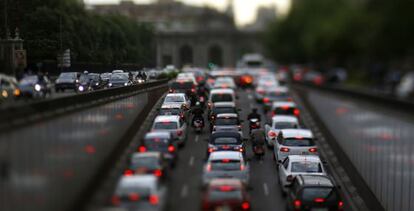Madrid mayor wants to restrict car access to Chueca and Malasaña neighborhoods
Officials hope these neighborhoods will join an ongoing drive to reduce traffic in the city center

Madrid officials are negotiating with residents and businesses in the neighborhoods of Chueca, Malasaña and Conde Duque to add them to a plan to close off the city center to non-residential car users before the spring, municipal sources have said.
From January 1 onward, the neighborhoods of Palacio and Sol will be off limits to vehicles except those belonging to residents. Violators will be monitored via 22 surveillance cameras, and served with €90 fines if they enter without permission.
This new Residential Priority Area (APR) will join two others already in existence in the downtown neighborhoods of Las Letras and Embajadores. The cost to city coffers will be €500,000 annually.
Surprisingly, the traffic-calming measures are being criticized by fellow members of the Popular Party
If Chueca, Malasaña and Conde Duque also accept the deal, it will add another 47,000 residents to the project.
Authorities want these neighborhoods to join before Mayor Ana Botella ends her term in office in May 2015. The Popular Party (PP) official has already stated that she will not run for re-election.
In May of this year, Botella said that “Madrid is for people, not for vehicles.”
The first APR was inaugurated in September 2004 by then-mayor Alberto Ruiz-Gallardón (now Spain’s justice minister). A year later, the experiment was extended to include 59 hectares that are home to 11,000 people and are enclosed by Puerta del Sol, Gran Vía, Paseo del Prado and Atocha street.
I am not very supportive of banning things; we work to allow people to choose freely,” Madrid regional premier Ignacio González
In July 2006, Gallardón expanded the restricted area to Embajadores, a neighborhood with 45,000 residents.
When Palacio and Sol join the group of APRs in January, there will be 85,000 Madrileños living in car-restricted areas.
Both the Madrid Socialist Party and United Left support the measure, which, somewhat surprisingly, is being criticized by certain sectors of the ruling PP.
“I am not very supportive of banning things; we work to allow people to choose freely,” said Ignacio González, the Popular Party’s regional premier in Madrid. We have the best transportation service, but that does not take away people’s freedom to choose their mode of transportation,”
González is ideologically close to his predecessor, Esperanza Aguirre, whom pundits say could run for mayor next year.
Tu suscripción se está usando en otro dispositivo
¿Quieres añadir otro usuario a tu suscripción?
Si continúas leyendo en este dispositivo, no se podrá leer en el otro.
FlechaTu suscripción se está usando en otro dispositivo y solo puedes acceder a EL PAÍS desde un dispositivo a la vez.
Si quieres compartir tu cuenta, cambia tu suscripción a la modalidad Premium, así podrás añadir otro usuario. Cada uno accederá con su propia cuenta de email, lo que os permitirá personalizar vuestra experiencia en EL PAÍS.
¿Tienes una suscripción de empresa? Accede aquí para contratar más cuentas.
En el caso de no saber quién está usando tu cuenta, te recomendamos cambiar tu contraseña aquí.
Si decides continuar compartiendo tu cuenta, este mensaje se mostrará en tu dispositivo y en el de la otra persona que está usando tu cuenta de forma indefinida, afectando a tu experiencia de lectura. Puedes consultar aquí los términos y condiciones de la suscripción digital.








































